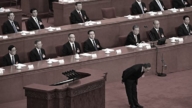【新唐人2014年08月27日訊】中共總書記習近平近日表示,要對國企高薪動刀,最近更傳出要砍掉央企高管薪酬的70%。對此學者指出,習近平想通過對央企動刀贏取民心,但可能因為損害太子黨的切身利益,因而受到阻力。這一步能否成功,還有待觀察。
8月18號,以習近平為組長的「中央深改小組」,審議了國企主要負責人薪酬改革方案,要對負責人履職待遇、業務支出做出新規定。
25號的《財經》雜誌援引知情人的說法表示,根據方案,央企負責人的薪酬率先將大幅削減七成,削減後年薪不能超過60萬元。
其實,目前國企負責人的薪酬是非常高的。
例如,目前五大國有銀行,主要負責人的薪酬都超過100萬元。「工商銀行」董事長姜建清,去年的年薪是199.56萬元;而「中石化」董事長傅成玉,在任職「中海油」董事長時,年收入更是高達1330萬元。
資料還顯示,石油、電力、電信等7個壟斷性國有行業,儘管職工人數佔全國不足8%,工資卻佔全國工資總額的55%,是市場的平均工資的5到10倍。
除此之外,從2001到2008年,國有及國有控股企業,纍計獲得國家財政補貼共64766.91億元。
國企受到的這些優待,在中國社會引發了極大的不滿。
哈佛大學政經博士楊建利表示,國企的存在本身就是不合理的。如果國企賠錢,要靠納稅人的錢養它們,但它們盈利納稅人卻一分錢紅利也分不到。
哈佛大學政經博士楊建利:「當公司賺錢的時候是自己的,賠錢的時候就不是自己的。而且國企是政府腐敗的重要一個環節,所以習近平在反腐的時候,拿國企開刀也是很自然的。」
另外,楊建利認為,從經濟學角度來講,應該靠市場來決定一個人的工資,而不應該是政府指定的。
北京獨立學者、歷史學家章立凡對香港《蘋果》日報指出,中共的財富王國分為兩類,一類是由「官二代」掌握的新興產業;另一類是「紅二代」掌管的央企。
章立凡認為,習近平想過對央企動刀贏取民心,這勢必引起「紅二代」「太子黨」們反彈,他的做法能不能成功,現在下結論還為時過早。
早在2012年12月,美國媒體《彭博社》發表長篇報導披露,他們通過對中共103名「太子黨」的調查指出,至少有26名「紅二代」掌控中國頂尖的國有企業。其中王震兒子王軍、鄧小平女婿賀平、陳雲的兒子陳元,光這3位「太子黨」,在2011年就掌握高達16000億美元的資產。
楊建利認為,如果經濟出現很大變動,政權也不穩定。
楊建利:「他們把持國家的工業命脈,如果他們抵制下去的話,整個國民經濟會受到很大的影響。如果經濟出現很大變動的話,政權也不穩定。」
實際上,國企高管的腐敗非常嚴重。從今年1月1號到6月23號,據媒體公開報導的不完全統計顯示,共有多達44名國企高管因貪腐落馬,涉案金額都很巨大。
採訪/田淨 編輯/宋風 後製/郭敬
Xi Jinping Cuts Executive Income, Will Princelings Resist?
Chinese leader Xi Jinping said in a recent meeting that
executives at state firms will face big pay cuts.
Rumors say that the cuts could be of up to 70%.
Scholars say that Xi intends to win citizens’ support
in this way, but, because it may damage princelings’
vital interests, he will likely face some obstacles.
Whether or not this move will be successful,
only time can tell.
On Aug. 18, central reform team led by Xi Jinping reviewed
the pay cut reform plan for top executives of state businesses.
The new plan aims at top executives’ welfare benefits
and company expenses.
Caijing magazine cited insiders that the plan says
top executives face pay cuts of up to 70%,
their annual income will not be in
excess of 600,000 yuan ($97,500) after that.
Actually, state-own company executives’ income is currently
very high.
For example, annual income of each top executive
at the five state-owned banks is over 1 million yuan.
Jiang Jianqing, Chairman of Industrial and Commercial Bank
of China, his income was about 2 million yuan last year.
Fu Chengyu, current Chairman of Sinopec, in his tenure at
China National Offshore Oil Corporation,
his annual income was 13.3 million yuan.
Former Premier Li Peng’s daughter, Li Xiaolin,
CEO of China Power International Development,
her salary has reached 3.12 million yuan in the past.
Sources show that seven monopolistic state enterprises
such as oil, electricity, telecommunications sectors,
although their employees make up less than 8% of national
employees, their total wages take up 55% of the national,
five to 10 times higher than the average in the market.
In addition, from 2001 to 2008, state-owned enterprises and
holding companies had 6.48 trillion yuan from fiscal subsidies.
It has caused great social discontent in China.
Yang Jianli, Ph.D of Harvard University, says that
state-owned enterprise is unreasonable.
If the company loses money, they rely on taxpayers’ money.
When they make a profit, taxpayers don’t get a penny.
Yang Jianli: “When a company makes money,
they keep it for themselves,
if they lose money, they won’t take the burden themselves.
State-owned firms are the main channels
of governmental corruption.
So it is common that Xi starts from enterprises first
during the anti-corruption fight.”
Yang Jianli also suggests that from the economic point of view,
the market should decide a person’s wages,
not the government.
Zhang Lifan, Beijing independent scholar told Hong Kong’s
Apple Daily that China’s wealth is of two kinds:
One is new sectors controlled
by second generation officials;
Another is Red second generation
that controls state-owned firms.
Zhang Lifan says that Xi wants to win
the support of Chinese people.
This certainly will cause resistance from
princelings and Red second generation.
It is too early to say if Xi can win.
In early Dec. 2012, Bloomberg reported that from
a survey of 103 princelings,
at least 26 control top state-owned businesses.
Amongst them, Wang Zhen’s son Wang Jun,
Deng Xiaoping’s son-in-law He Ping and
Chen Yun’s son Chen Guang controlled
$1.6 trillion of assets in 2011.
Gong Shengli, Chief researcher of Beijing National Conditions
Inside Reference says that these Red second generation
have quite certain power.
Now that Xi Jinping wants to cut their interests,
the resistance will be huge.
Gong Shengli: “Li Peng’s son is a legal representative
of the country’s energy or electricity sectors.
I think Xi’s taking a considerable risk.”
Yang Jianli: “They control the country’s industrial lifeline,
If they resist the national economy
will be greatly affected.
If the changes to the economy are great,
his power will not stable.”
Yang Jianli observes that conflict between Xi and
second generation officials will shake Communist party rule.
Xi likely will make a concession in the end.
Actually, top executives at state-owned firms are very corrupt.
From Jan. 1 to June 23, 44 executives reportedly were
dismissed because of corruption.
It had involved huge amounts of cash.
Interview/TianJin Edit/SongFeng Post-Production/GuoJing

























